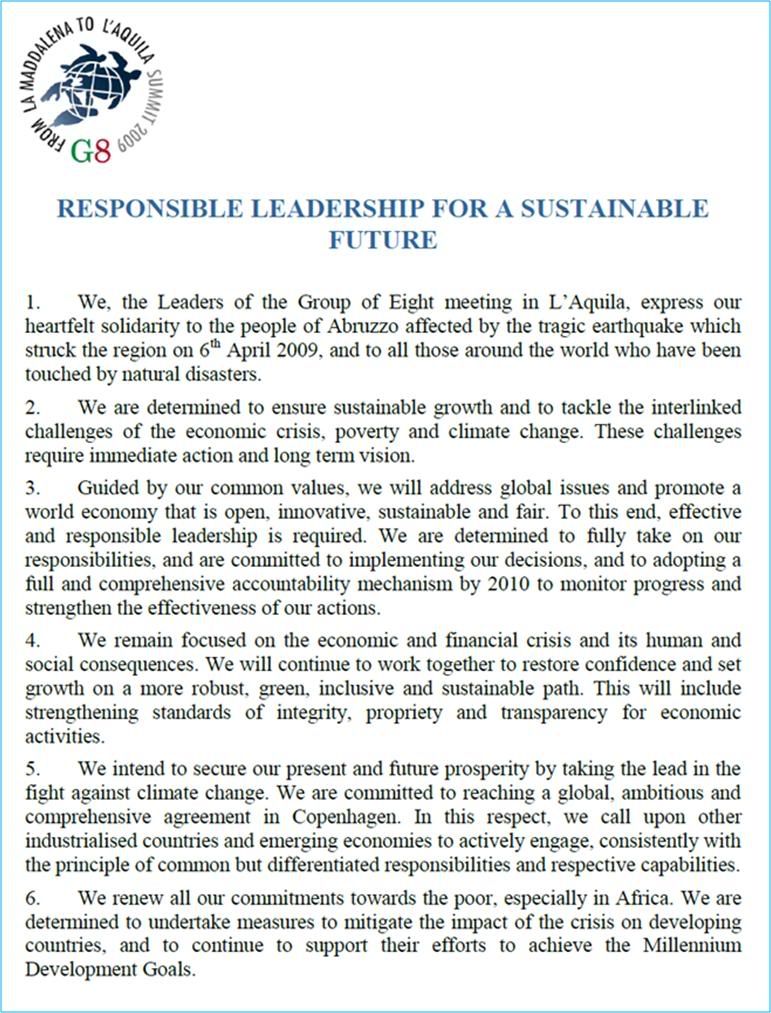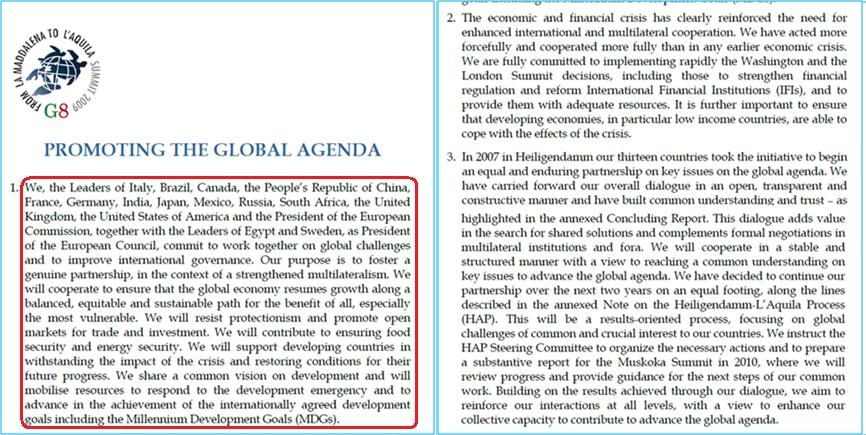

 The leaders meeting at L'Aquila obviously had their final statements ready before they came together. Since the G8 summit opened yesterday, they have already issued a number of statements, the full texts of which may be seen on the G8 summit official site
www.g8italia2009.it/G8/Home/Summit/G8-G8_Layout_locale-1199882116809_...
Yesterday, the major statement was their 40-page detailed Declaration on Responsible Leadership for a Sustainable Future; and today, their statements included a Joint Declaration on Promoting the Global Agenda and a Declaration on Energy and Climate.
The leaders meeting at L'Aquila obviously had their final statements ready before they came together. Since the G8 summit opened yesterday, they have already issued a number of statements, the full texts of which may be seen on the G8 summit official site
www.g8italia2009.it/G8/Home/Summit/G8-G8_Layout_locale-1199882116809_...
Yesterday, the major statement was their 40-page detailed Declaration on Responsible Leadership for a Sustainable Future; and today, their statements included a Joint Declaration on Promoting the Global Agenda and a Declaration on Energy and Climate.
 Above, Page 1 of the July 8 general declaration, and below, Page 1 of the July 9 declaration on the global agenda.
Above, Page 1 of the July 8 general declaration, and below, Page 1 of the July 9 declaration on the global agenda.
 Why does it matter for this Forum? Because the Holy Father has laid his moral authority on the line to speak up for the poorer nations - if only in writing - to this summit where they are not represented, and because his new encyclical Caritas in veritate touches specifically on many issues that the G8 declarations also address with the noblest of intentions.
Why does it matter for this Forum? Because the Holy Father has laid his moral authority on the line to speak up for the poorer nations - if only in writing - to this summit where they are not represented, and because his new encyclical Caritas in veritate touches specifically on many issues that the G8 declarations also address with the noblest of intentions.
A Vatican observer who has read through the G8 declarations has interesting observations, but the most important seems to be that they say nothing about why they have so far failed to meet the commitments they made in 2000 towards development aid for poorer nations as well as the UN Millennium Development Goals (MDG).
In repeated statements, even before the new encyclical, Benedict XVI has called on the developed nations to fulfill these commitments.
The Pope's encyclical
and the G8 declarations
by Giorgio Bernardelli
Translated from

On the one hand, a long reflection on the roots of the present financial crisis, with the ethics of globalization in the center.
On the other hand, a detailed document, signed by the leaders of the eight most industrialized nations on earth, with a series of interesting ideas that have to do with development in Africa, climate change, the worldwide food emergency, and itnernational rules for economy and finance.
Benedict XVI's encyclical
Caritas in veritate and the L'Aquila Declaration of the G8 Leaders were published barely 24 hours apart.
Reading them together, one cannot overlook the fact that in certain points, the two documents are saying the same thing. Of course, the viewpoints are different, and the Pope obviously does not get into the details of any necessary political measures to be taken.
But there are some basic ideas that are common to both: the need for a truly inclusive globalization of the economy; the urgency of facing the ecologic challenge; the need to do much more for Africa; the idea that the need to provide food for everybody should be at the top of the international agenda.
Does it mean that the leaders of the world's richest nations are finally starting to see the light? It's not advisable to be too enthusiastic. Because there is another similarity between the two documents: they both refer to previous 'position papers'.
Benedict XVI cites Paul VI's
Populorum progressio and all other declarations by the Magisterium that in order to be truly sustainable, globalization should be equitable.
The G8 declaration, on the other hand, cites a long series of agreements and previous positions taken on hunger, development, the Millennium Development Goals. To say that this time, unlike in the past, we should take these positions seriously!
[So what were they meant to be in the past? Mere paper sops?]
Good intentions are always...good, naturally. But there is a question that is never posed at these summits: Why have the leaders failed to fulfill commitments that they have signed up for and underscored with high-sounding words? Can one blame it on bad faith on the part of these governments or on accidental factors?
That is where
Caritas in veritate differs, and we dare say, it is far more interesting compared to the G8 declarations.
Because it tries to appeal to reason. And shows that, ultimately, states and leaders have to choose whether justice is really a key principle that governs their political and economic decisions, or whether they will continue to look at the world's major problems as nothing more than 'a shopping list' of expenditures. When the shopping cart is full, and there is not enough money to pay for it, how do they determine what can be left behind for the time being?
Much has been written about the crisis. But the real crisis that this black 2009 has made obvious to everyone is a crisis in common sense. It is not remedied by asking every day, "When will we get out of this crisis?" Who is we: just us, or everyone? And we get out of the crisis into what? These are the direct questions that the Pope poses in his encyclical.
Only if we - and those who are in a position to make the decisions that can turn things around - keep in mind the basic principle of equitable justice for all as the expression of charity in truth can we hope that commitments made by the richest nations (including us in Italy) will not continue to be mere paper promises.
[Modificato da TERESA BENEDETTA 10/07/2009 00:10]